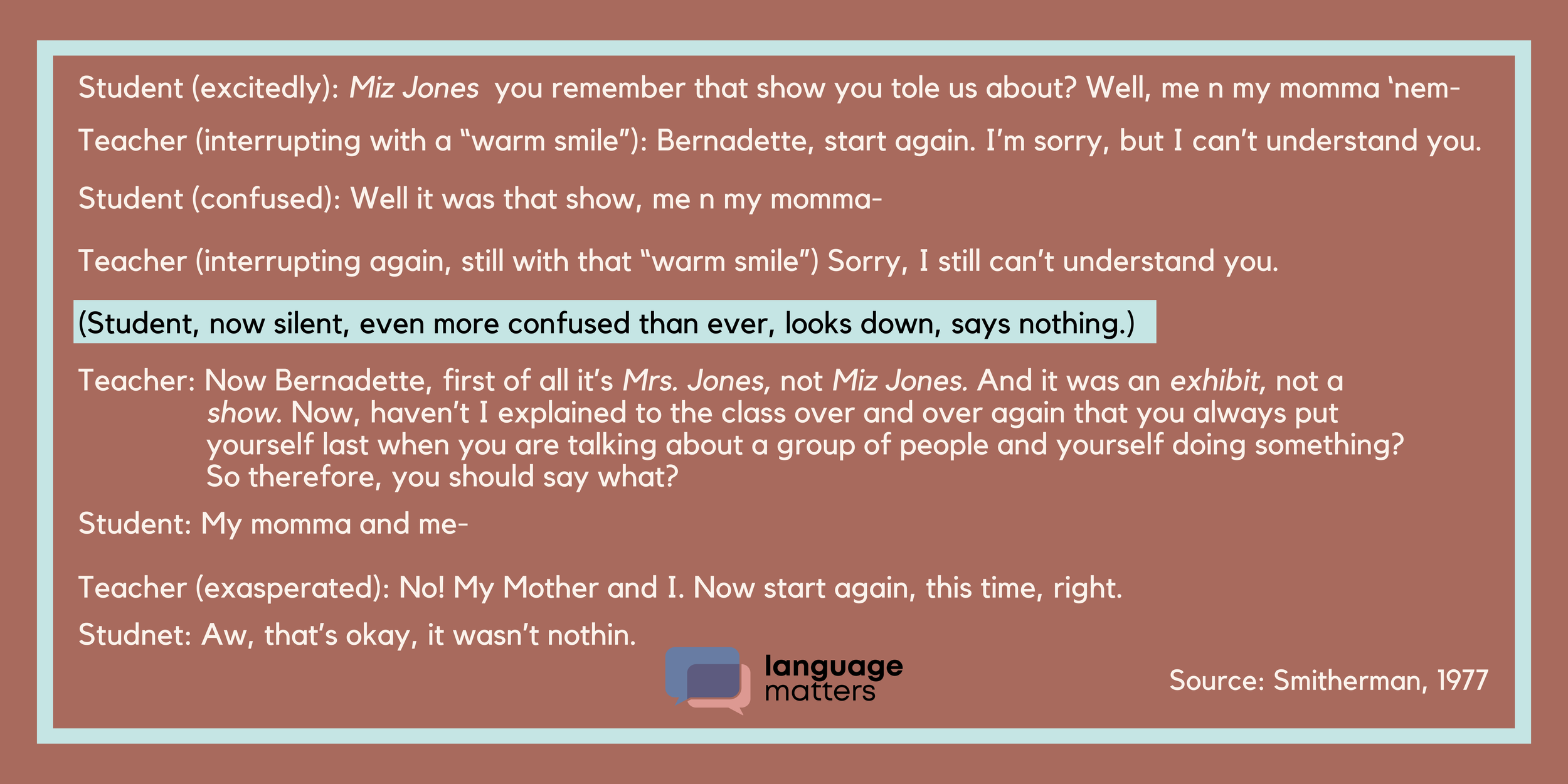The White Listening Subject: Part 1
During a coaching session with a group of equity-minded administrators, I had one Director ask me, “Lillian: Is there any evidence regarding how working on Monolingual Bias impacts a school district as far as positive outcomes?”
Well, the answer is: no and yes.
No. You won’t find efficacy studies around the disruption of monolingual ideologies. This has to do with methodological issues (most of these studies are self-reports) and these kinds of studies don’t typically get funded. You will find books like this one, and this one. Each has chapters that discuss qualitative, case-study examples. But the long and short of it is: we cannot PROVE with any certainty that investing in Monolingual Bias disruptions will lead to improved academic outcomes for students.
Not Yet.
And on the other hand- there is evidence everywhere you turn. Every single time you go into a classroom with bilingual and ELL students- when you see them withdrawn, or disruptive, or with low attendance rates and high dropout rates. Regrettably, this kind of data is everywhere, and you (the progressive educator who reads a blog about sociolinguistics) are desperately searching for some answers and a way forward.
Sociolinguistics Enters Stage Right
This will be the first of 2 blog posts about a powerful sociolinguistic concept that has been in the making for nearly 50 years. To clarify, sociolinguistics is the study of the relationship between language and society. My blog posts explore relationships between language (usage and as a tool of power) within education.
Here’s our roadmap:
I will introduce you to an OG Monolingual Bias Disruptor
You will watch my reenactment of a harrowing interaction between a White teacher and her Black student
I will run the transcript through a sociolinguistic analysis (h/t Jonathan Rosa and Nelson Flores)
I’ll give you some ways to apply this new sociolinguistic concept to your disruption work in schools
Brace yourself, this aint gonna be pretty and your blood will *likely boil*. But as Dr. Kathy Escamilla is prone to say, “I share this with you to make you mad, so you’ll take action.” After all, how else do we change history?
Thank you Dr. Geneva Smitherman
Let’s travel back in time to the mid 1970s, where we’ll find Dr. Geneva Smitherman’s research in Detroit public schools. Dr. Smitherman was a trailblazer in educational research, exploring the lives and experiences of Black schoolchildren at a time of school integration. In her book Talkin’ and Testifyin (1977), she shares a bit of data from a 1st grade classroom. In it, we hear Ms. Jones, a White middle-aged woman, interrupt a story as told to her by a Black 1st grade student, Bernadette. I use this transcript to illustrate a few points about language ideologies and the slipperiness through which they emerge in everyday classroom interactions.
Let’s explore the teacher first, because teachers, practically speaking, wield power in classroom spaces. Ms. Jones likely came into the teaching profession with a belief about proper grammar and her call to politely correct children’s speech. She believes that helping students of color, like Bernadette, develop the “proper” ways of speaking is going to help Bernadette present as educated, find success according to the White, middle class values she subscribes to. And yet, it is my firm belief that every teacher is doing their best. I also believe teachers care deeply for their students, in their own way. The problem is, Ms. Jones shows her caring by correcting Bernadette, and I hope to illustrate the WHY behind her belief in a moment.
For now, watch this reenactment of the classroom dialogue between Ms. Jones and Bernadette and consider how power, bias and language ideologies emerge through their brief conversation. You will also find the transcript below.
If you are like me, you could feel Bernadette’s enthusiasm and sense of self worth deflate with each “I don’t understand you” comment. Here is where a sociolinguistic analysis may help us understand how Ms. Jones could be so blatantly cruel to her eager 1st grader.
Come back for part two in a few weeks! In the meantime, if you haven’t already downloaded my support guide, do so now.
Or… if you simply can’t wait for the next blog post to arrive, drop me a line and tell me what comes up for you when you watch this video/ read the transcript:

